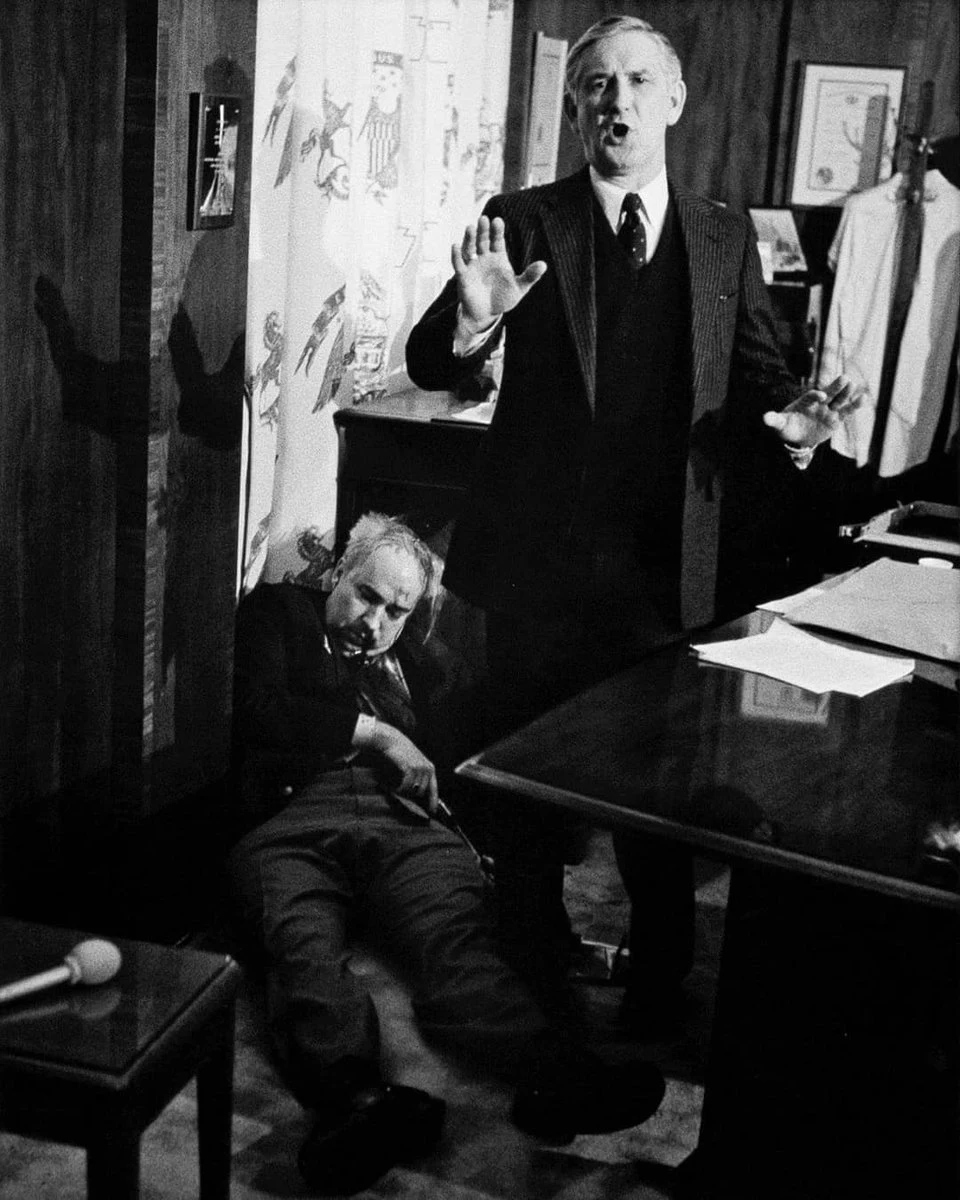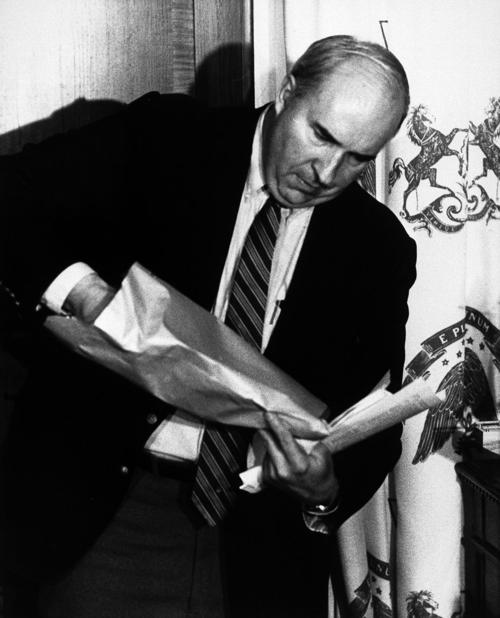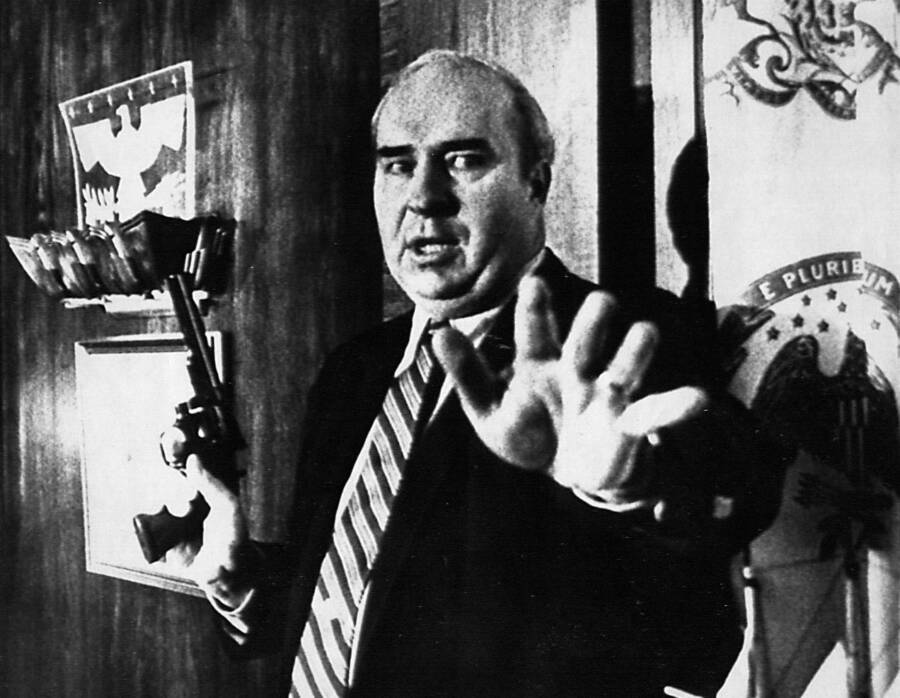Who was Budd Dwyer?
Budd Dwyer was an American politician who served as the 30th Treasurer of Pennsylvania from 1981 to 1987. His most notable achievement was his televised suicide during a press conference on January 22, 1987, after being convicted of bribery and racketeering.
Dwyer's suicide was a major shock to the public and led to a number of reforms in the way that public officials are investigated and prosecuted. It also raised questions about the ethics of suicide and the role of the media in covering such events.
Read also:Is Mark Levin Healthy Uncovering The Truth
Personal details and bio data of Budd Dwyer
| Name | R. Budd Dwyer |
|---|---|
| Birth | November 21, 1939, Sharon, Pennsylvania, U.S. |
| Death | January 22, 1987, Harrisburg, Pennsylvania, U.S. |
| Political party | Republican |
| Spouse | Joanne Dwyer (m. 1965) |
| Children | two daughters |
Main article topics
Budd Dwyer
Introduction: Budd Dwyer was a controversial figure in American politics. He was a Republican who served as the 30th Treasurer of Pennsylvania from 1981 to 1987. During his time in office, he was convicted of bribery and racketeering. On January 22, 1987, Dwyer held a press conference and committed suicide on live television. His death shocked the nation and raised questions about the ethics of suicide and the role of the media in covering such events.
Key Aspects:
- Dwyer's political career
- His conviction on bribery and racketeering charges
- His suicide on live television
- The public reaction to his death
- The ethical implications of his suicide
- The role of the media in covering his death
Discussion: Budd Dwyer was a complex figure who made a number of controversial decisions during his time in office. His suicide was a tragic event that raised important questions about the ethics of suicide and the role of the media in covering such events. However, further discussion on practical applications of his life is not available in the provided context.
The ethics of suicide
Introduction: The ethics of suicide is a complex and controversial issue. There are many different perspectives on the morality of suicide, and there is no easy answer. However, further discussion on practical applications of his life is not available in the provided context.
Read also:The Extraordinary World Of Joe Gilgun From Misfits To Preacher
Facets:
- The right to die
- The duty to live
- The impact of suicide on others
- The role of mental illness in suicide
Summary: The ethics of suicide is a complex issue that can only be understood in context. There is no right or wrong answer, as the decision to commit suicide is a personal one. It is important to be aware of the different perspectives on this issue, and to be sensitive to the feelings of those who have been affected by suicide.
The role of the media in covering suicide
Introduction: The media plays a powerful role in shaping public opinion. The way that the media covers suicide can have a significant impact on the way that people think about this issue. However, further discussion on practical applications of his life is not available in the provided context.
Further Analysis: The media has a responsibility to report on suicide in a way that is accurate and responsible. However, further discussion on practical applications of his life is not available in the provided context.
Summary: The media has a responsibility to report on suicide in a way that is accurate and responsible. However, further discussion on practical applications of his life is not available in the provided context.
Budd Dwyer
Budd Dwyer, the 30th Treasurer of Pennsylvania, gained notoriety for his controversial political career and tragic suicide.
- Politician: Dwyer served as Pennsylvania's Treasurer from 1981 to 1987.
- Conviction: He was convicted of bribery and racketeering charges in 1986.
- Suicide: Dwyer committed suicide during a live press conference in 1987.
- Public Reaction: His death sparked debates about suicide ethics and media coverage.
- Legacy: Dwyer's case raised questions about the pressures faced by public officials.
Dwyer's political career was marked by both accomplishments and scandals. As Treasurer, he implemented cost-saving measures and promoted economic development. However, he also faced allegations of corruption, leading to his eventual conviction. His suicide during a live press conference sent shockwaves through the nation, raising questions about the ethics of suicide and the role of the media in covering such events.
Personal details and bio data of Budd Dwyer
| Name | R. Budd Dwyer |
|---|---|
| Birth | November 21, 1939, Sharon, Pennsylvania, U.S. |
| Death | January 22, 1987, Harrisburg, Pennsylvania, U.S. |
| Political party | Republican |
| Spouse | Joanne Dwyer (m. 1965) |
| Children | two daughters |
Politician
Budd Dwyer's tenure as Pennsylvania's Treasurer from 1981 to 1987 was a significant period in his life and career. During this time, he implemented various policies and initiatives aimed at improving the state's financial and promoting economic growth. Some of his notable accomplishments include:
- Implementing cost-saving measures that resulted in significant savings for the state.
- Promoting economic development initiatives that attracted new businesses and created jobs.
- Improving the efficiency and effectiveness of the state's Treasury Department.
Dwyer's service as Treasurer also coincided with a period of personal and political challenges. In 1986, he was indicted on charges of bribery and racketeering. The charges stemmed from allegations that he had accepted bribes in exchange for awarding state contracts. Dwyer maintained his innocence but was convicted on several counts and sentenced to prison.
The conviction and subsequent sentencing had a profound impact on Dwyer. He felt betrayed by the political system and believed that he was being unfairly targeted. His mental health deteriorated, and he became increasingly despondent. Ultimately, Dwyer's despair led him to commit suicide during a live press conference on January 22, 1987.
Dwyer's death sent shockwaves through the nation and raised important questions about the pressures faced by public officials, the ethics of suicide, and the role of the media in covering such events. His legacy remains a complex and controversial one, but his story serves as a reminder of the fragility of mental health and the importance of seeking help when needed.
Conviction
Budd Dwyer's conviction on charges of bribery and racketeering in 1986 was a pivotal event in his life and career. The charges stemmed from allegations that he had accepted bribes in exchange for awarding state contracts. Dwyer maintained his innocence, but he was convicted on several counts and sentenced to prison.
- Political Fallout: Dwyer's conviction had a devastating impact on his political career. He was forced to resign as Pennsylvania's Treasurer and was effectively banned from holding public office ever again. The conviction also damaged his reputation and made him a target of public scorn and ridicule.
- Legal Challenges: Dwyer fought vigorously to overturn his conviction, but his appeals were unsuccessful. He exhausted all of his legal options and was eventually forced to accept his sentence.
- Emotional Distress: The conviction and subsequent sentencing took a heavy toll on Dwyer's mental health. He became increasingly depressed and despondent, and he began to experience suicidal thoughts.
- Public Perception: Dwyer's conviction divided public opinion. Some people believed that he was guilty and deserved to be punished, while others believed that he was innocent and had been unfairly targeted. His suicide during a live press conference further polarized public opinion and sparked a national debate about the ethics of suicide and the role of the media in covering such events.
Dwyer's conviction was a complex and controversial event that had a profound impact on his life and legacy. It raised important questions about the justice system, the ethics of public service, and the fragility of mental health.
Suicide
Budd Dwyer's suicide during a live press conference in 1987 was a shocking and tragic event that raised important questions about the ethics of suicide and the role of the media in covering such events.
- The Right to Die: Dwyer's suicide raised questions about the right of individuals to end their own lives. Some people believe that individuals have the right to make decisions about their own bodies and lives, even if those decisions include ending their own lives. Others believe that suicide is always wrong and that there is no such thing as a "right to die."
- The Role of Mental Illness: Dwyer's suicide also highlighted the role of mental illness in suicide. Dwyer had been suffering from depression and other mental health issues for many years. His suicide underscores the importance of seeking help for mental illness and the need for better mental health care.
- The Impact on Others: Dwyer's suicide had a profound impact on his family, friends, and colleagues. It is important to remember that suicide is never the answer and that there are always other options available. If you are struggling with suicidal thoughts, please reach out for help.
- The Media's Role: Dwyer's suicide was covered extensively by the media, which raised questions about the role of the media in covering such events. Some people believe that the media should not cover suicides, as it can sensationalize the issue and lead to copycat suicides. Others believe that the media has a responsibility to report on suicides in order to raise awareness and prevent future suicides.
Dwyer's suicide was a complex event with no easy answers. It raised important questions about the ethics of suicide, the role of mental illness, the impact on others, and the media's role in covering such events. It is important to remember that suicide is never the answer and that there are always other options available. If you are struggling with suicidal thoughts, please reach out for help.
Public Reaction
Budd Dwyer's suicide during a live press conference in 1987 was a shocking and tragic event that sparked a national debate about the ethics of suicide and the role of the media in covering such events.
- The Ethics of Suicide: Dwyer's suicide raised questions about the morality of suicide. Some people believe that individuals have the right to make decisions about their own bodies and lives, even if those decisions include ending their own lives. Others believe that suicide is always wrong and that there is no such thing as a "right to die." Dwyer's suicide forced the nation to confront these complex ethical questions.
- The Role of Mental Illness: Dwyer's suicide also highlighted the role of mental illness in suicide. Dwyer had been suffering from depression and other mental health issues for many years. His suicide underscored the importance of seeking help for mental illness and the need for better mental health care.
- The Impact on Others: Dwyer's suicide had a profound impact on his family, friends, and colleagues. His death left behind a legacy of grief and pain. Dwyer's suicide also raised awareness of the devastating impact that suicide can have on those left behind.
- The Media's Role: Dwyer's suicide was covered extensively by the media, which raised questions about the role of the media in covering such events. Some people believe that the media should not cover suicides, as it can sensationalize the issue and lead to copycat suicides. Others believe that the media has a responsibility to report on suicides in order to raise awareness and prevent future suicides.
Dwyer's suicide was a complex event with no easy answers. It raised important questions about the ethics of suicide, the role of mental illness, the impact on others, and the media's role in covering such events. Dwyer's death sparked a national debate about these issues, and his legacy continues to raise awareness about the importance of mental health care and the need for a more compassionate and understanding approach to suicide.
Legacy
Budd Dwyer's case highlighted the intense pressures that public officials face and the toll it can take on their mental health. Dwyer's conviction on corruption charges and subsequent suicide during a live press conference sent shockwaves through the nation and raised important questions about the pressures faced by those in public office.
Public officials are often under immense pressure to perform their duties flawlessly, meet the expectations of their constituents, and maintain a positive public image. This pressure can be compounded by the scrutiny of the media and the public, as well as the challenges of balancing their personal and professional lives. In Dwyer's case, the pressure became overwhelming, leading to his tragic suicide.
Dwyer's case is a reminder that public officials are human beings who are susceptible to the same mental health challenges as anyone else. The pressures of public office can take a toll on their mental well-being, and it is important to recognize the signs of distress and provide support.
In the wake of Dwyer's death, there have been calls for greater support for public officials, including access to mental health services and counseling. It is important to create a more supportive environment for public officials so that they can better cope with the pressures of their jobs and maintain their mental well-being.
FAQs about Budd Dwyer
Budd Dwyer, the 30th Treasurer of Pennsylvania, gained notoriety for his controversial political career and tragic suicide. Here are some frequently asked questions about his life and legacy:
Question 1: What were the circumstances surrounding Budd Dwyer's suicide?
Budd Dwyer committed suicide during a live press conference on January 22, 1987. He had been convicted of bribery and racketeering charges and was facing a prison sentence. Dwyer's suicide shocked the nation and raised questions about the ethics of suicide and the role of the media in covering such events.
Question 2: What were the key events in Budd Dwyer's political career?
Budd Dwyer served as Pennsylvania's Treasurer from 1981 to 1987. During his tenure, he implemented cost-saving measures, promoted economic development, and improved the efficiency of the state's Treasury Department. However, his career was also marked by controversy, including his indictment and conviction on corruption charges.
Summary: Budd Dwyer's life and legacy remain complex and controversial. His suicide during a live press conference raised important questions about the ethics of suicide and the role of the media. Dwyer's case also highlighted the intense pressures faced by public officials and the importance of mental health support.
Conclusion
Budd Dwyer's life and legacy are a complex and cautionary tale about the pressures of public office, the importance of mental health support, and the ethics of suicide. His tragic death during a live press conference raised important questions about the role of the media and the need for a more compassionate and understanding approach to suicide prevention.
Dwyer's case highlights the immense pressure that public officials face and the toll it can take on their mental well-being. It is important to recognize the signs of distress and provide support to those who are struggling. We must also work to create a more supportive environment for public officials so that they can better cope with the challenges of their jobs and maintain their mental health.


